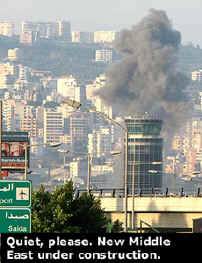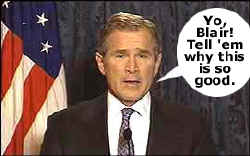If there was ever any doubt in anyone’s mind that the U.S. has been an obstacle to peace, it’s certainly gone now. It’s kind of appalling to watch the world grope for a way to accommodate George Bush’s and Ehud Olmert’s  preconditions for a cease fire in Lebanon. As foreign ministers and diplomats haggle at the U.N., people continue to die in the Levant. Israel attacked a hospital in southern Lebanon, capturing what it described as Hezbollah fighters but what a Hezbollah parliamentarian said were civilians, several of whom were in their 50s. The Hezbollah guy challenged Israel to show the people they captured, but quite frankly, the same demand might be made regarding any of the thousands of detainees Israel holds without charge. Now the IDF is pursuing a push up to the Litani, strafing little fishing boats south of Beiruit, while Hezbollah is promising to respond by targeting Tel Aviv.
preconditions for a cease fire in Lebanon. As foreign ministers and diplomats haggle at the U.N., people continue to die in the Levant. Israel attacked a hospital in southern Lebanon, capturing what it described as Hezbollah fighters but what a Hezbollah parliamentarian said were civilians, several of whom were in their 50s. The Hezbollah guy challenged Israel to show the people they captured, but quite frankly, the same demand might be made regarding any of the thousands of detainees Israel holds without charge. Now the IDF is pursuing a push up to the Litani, strafing little fishing boats south of Beiruit, while Hezbollah is promising to respond by targeting Tel Aviv.
This would be a real good time for everyone to stop the hostilities, don’t you agree? Well… even if you do, George Bush doesn’t and neither does the Israeli government, not just yet. Their determination to attain political objectives through wanton violence differs from the tactics of Bin Laden only in scale – Dubya’s attack on Iraq dwarfs the 9/11 death toll by an enormous factor, and Olmert’s war against Lebanese society has the potential to do the same. The Bush administration’s craven insistence that this is somehow going to lead to a better Middle East underscores the contention that this is a deliberate escalation of hostilities and yet another war of choice in that troubled region. Now Dubya’s off for a ten-day break at his ersatz ranch in Crawford, Texas, there to hack away at scrub with various power tools as a small army of secret service men try to look like ranch hands and talk into their cufflinks. I suppose if he’s going to sit on his hands, he might as well do it there. (How like Nero’s fiddle is Bush’s chain saw – scratching away tunelessly as the empire burns.)
 Even as the middle east is drenched in blood (Iraq, of course , continuing its slide toward the total anarchy Bush terms “freedom”), there was also time enough to crow about Fidel Castro’s health problems, as the key Bush constituency of Cuban exiles celebrated in Miami and major news outlets pondered what Washington’s “options” might be. My hometown newspaper ran an interesting little chart that compared various socio-economic statistics in Cuba and the U.S. – a comparison in which Cuba fared quite well, actually. Pretty remarkable when you consider the difference in available resources and the fact that Cuba has been under embargo for decades. Far more instructive would be a similar comparison between Cuba and, say, Guatemala or Honduras, since that is the model that America’s political culture would like to see Cuba adopt, post-Castro. Troubled as Cuba’s living standard is, it’s not anywhere near as miserable as that of its neighbors, whose economies are totally supine to U.S. economic power. Even so, the press opines how Cuba is a “nation ripe for economic change” and how its “enormous pent-up consumer demand” and 97 percent literacy rate make “Cuba’s workforce… hungry to work and full of potential.”
Even as the middle east is drenched in blood (Iraq, of course , continuing its slide toward the total anarchy Bush terms “freedom”), there was also time enough to crow about Fidel Castro’s health problems, as the key Bush constituency of Cuban exiles celebrated in Miami and major news outlets pondered what Washington’s “options” might be. My hometown newspaper ran an interesting little chart that compared various socio-economic statistics in Cuba and the U.S. – a comparison in which Cuba fared quite well, actually. Pretty remarkable when you consider the difference in available resources and the fact that Cuba has been under embargo for decades. Far more instructive would be a similar comparison between Cuba and, say, Guatemala or Honduras, since that is the model that America’s political culture would like to see Cuba adopt, post-Castro. Troubled as Cuba’s living standard is, it’s not anywhere near as miserable as that of its neighbors, whose economies are totally supine to U.S. economic power. Even so, the press opines how Cuba is a “nation ripe for economic change” and how its “enormous pent-up consumer demand” and 97 percent literacy rate make “Cuba’s workforce… hungry to work and full of potential.”
Perhaps someone should ask the Cubans in Cuba whether or not they want the Guatemalan model for economic misery. While they’re at it, they should ask the Iraqis, as well.
